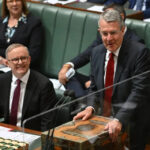Climate change: a global responsibility, but apparently not Australia’s
The government recently released its intergenerational report providing a snapshot of what the nation might look like in 40 years. Madeleine Ivett says the fact that climate change only gets a passing mention shows the lack of responsibility for our future.
In a report set out to project Australia’s future, a lack of acknowledgement of climate change shows a lack of responsibility for Australia.
Climate change, despite being a matter of fact, is comfortably positioned within the political sphere with debates continually flaring up across the country. It would seem the great Australian tradition of a few beers in the backyard while chowing down on some barbequed steak never ceases to open the flood gates to a good ol’ climate change debate.
Joe Hockey’s Intergenerational report is no exception to the ‘we didn’t do it’ attitude with no hard facts or real trajectory into the implications of climate change on Australia’s future.
Although there is a small mention of climate change, its validity is questioned, as the report has no plans to tackle climate change after 2020. It is apparent that the government is in denial of the risks and outcomes not only for the environment but also the economy (Christoff, 2015).
Eltham (2015) points out there is no discussion of the cost of more extreme wether patterns including intense heat, bush fires, flooding and other natural disasters. However, the ramifications of climate change are clearly outlined. For example, Head, Adams, McGregor & Toole (2014) state that climate change will bring on substantial economic implications for a range of areas including agriculture, bio-diversity and infrastructure. Without a shift in thinking from the government, Australia will be susceptible to the full force of these issues and their costs.
Despite Joe Hockey’s forward stating the ‘best years are ahead of us’ (Hockey, 2015), The CSIRO and the BoM’s State of Climate Report (2014) outline some of the already felt implications of climate change. Air and ocean temperatures are almost 1 degree warmer than they were in 1910. The report predicts that the warming will continue to rise over this century (CSIRO, 2014). So Mr Hockey, what part of ‘harnessing the potential of the future’ means leaving out one of the greatest challenges of our time, climate change?
Joe Hockey is not the only Liberal party member who’s purposefully downplayed the significance of climate change. The delightful Mr Tony Abbott, who never ceases to amaze on this issue, was questioned regarding the reports lack of climate change representation. Mr Abbott stated, “We have a clear… we have a strong and effective policy to deal with climate change”. This was said moments after he read a line from the report claiming some of the effects of climate change are in fact beneficial to the agriculture industry (Cox, 2015).
The current government is not only taking little to no responsibility for our country’s future but also failing to participate in the much-needed global shift to a sustainable future for the new world’s population. Climate change is not just an intergenerational issue; the effects are being felt today, and the government must take action to address these issues to ensure our planet remains a sustainable and liveable place.
References:
- Christoff, P. (2015). Climate Change Is An Intergenerational Issue, But The Report Ducked It. Retrieved from The Conversation.
- The Commonwealth Scientific and Industrial Research Organisation. (2014). The State of Climate Report.
- Cox, L. (6 March 2015). Cut from a chapter to three pages: Intergenerational Report accused of ignoring climate change. Retrieved from The Sydney Morning Herald.
- Eltham, B. (5 March 2015). Climate Change? What Climate Change! And Other Tales from the Intergenerational Report. Retrieved from New Matilda.
- Head, L., Adams, M., McGregor, H. V., & Toole, S. (2014). Climate Change and Australia. Wiley Interdisciplinary Reviews: Climate Change, 5(2), 175-197. doi: 10.1002/wcc.255
- Hockey, J. B., The Treasurer of the Commonwealth of Australia. (2015). 2015 Intergenerational Report Australia in 2055.
Madeleine Ivett lives in Brisbane where she is three years into her social work degree at the Queensland University of Technology. Her interests are in advocacy, social policy and child and family social work. She has always had a passion for helping and supporting those around her and cannot wait to peruse her career as a social worker.














